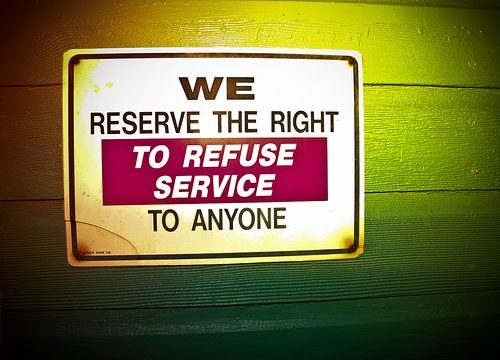Losing Your Right To Say No

 A new Pew poll looking at the intersection of religion and politics found that a plurality of Americans – 49 percent – believe that a business should be required to provide services to a homosexual marriage even if they find such ceremonies to be immoral.
A new Pew poll looking at the intersection of religion and politics found that a plurality of Americans – 49 percent – believe that a business should be required to provide services to a homosexual marriage even if they find such ceremonies to be immoral.
The poll’s respondents are closely divided. Nearly as many, 47 percent, say that the businesses should have a right to refuse. But even so, nearly half of the nation (if this poll is representative) saying that businesses don’t have a right to refuse is frightening stuff.
All the more so as the courts have so far come down on the side of the plurality. Earlier this year the Supreme Court refused to take up a case out of New Mexico where a wedding photographer was fined for refusing to work a gay marriage. That decision allowed a lower court ruling upholding the state’s anti-discrimination law to stand,
The argument in support of New Mexico’s law holds that the 14th amendment requires equal treatment under the law.
The problem with this argument is that the 14th amendment grants us the right to equal treatment by the government. Not equal treatment from private citizens. A photographer refusing to work at a specific wedding for moral reasons is no more an equal protection issue than people refusing to read a particular blog, or watch a particular television show.
Or a vegetarian restaurant refusing to serve steaks.
When do we have the right to say no? Can the government create laws that compel us to provide goods or services to other private citizens unwillingly? If such laws are legal, is the 1st amendment an exception? Or can business, as the oft-seen sign states, “reserve the right to refuse service to anyone?”
Are there any limits to when the government can compel our service? That’s the conundrum created when people say they have a “right” to something. It compels those engaged in the act of providing the something to serve you whether they want to or not.
Unwilling service is what most people call slavery.
It doesn’t matter whether or not we agree with Huguenin’s attitudes about gay marriage. The ACLU certainly couldn’t be said to agree with the political/social beliefs of the Nazis or Klan members they’ve defended in the past (not the Huguenin is on par with either of those hateful groups).
This isn’t a “should gays be allowed to marry” question. The question is, can gays compel others to participate in their weddings?
Lots of people – including many political leaders right here in North Dakota – seem to think that answer is yes.
That’s a problem in a free society, and one that probably stems from an attitude we’ve developed which treats businesses as de facto public utilities. Employers are treated as distribution points for health insurance and retirement planning. A job above a certain wage is talked about as though it were a right, and not a negotiated relationship between two parties.
People seem to think that they not only have a right to demand that their employer provide them with benefits like health insurance, but that those benefits cover things like contraception, even if the employer doesn’t want to pay for that.
Is it any wonder, then, that when it comes to refusing service many feel employers don’t have any rights? Including the right to say no?
It’s not just businesses either. Remember that we also have a health insurance law these days which compels you to purchase health insurance, even if you don’t need or want it.
We all have our opinions on things like health insurance and gay marriage – I happen to think that insurance is a good idea, and that consenting adults can arrange themselves in whatever unions they wish – but those stances are beside the point. Individuals, be they a lone citizen or the head of a business, should be allowed to make decisions for themselves.
Even if those decisions are unpopular with the masses.




